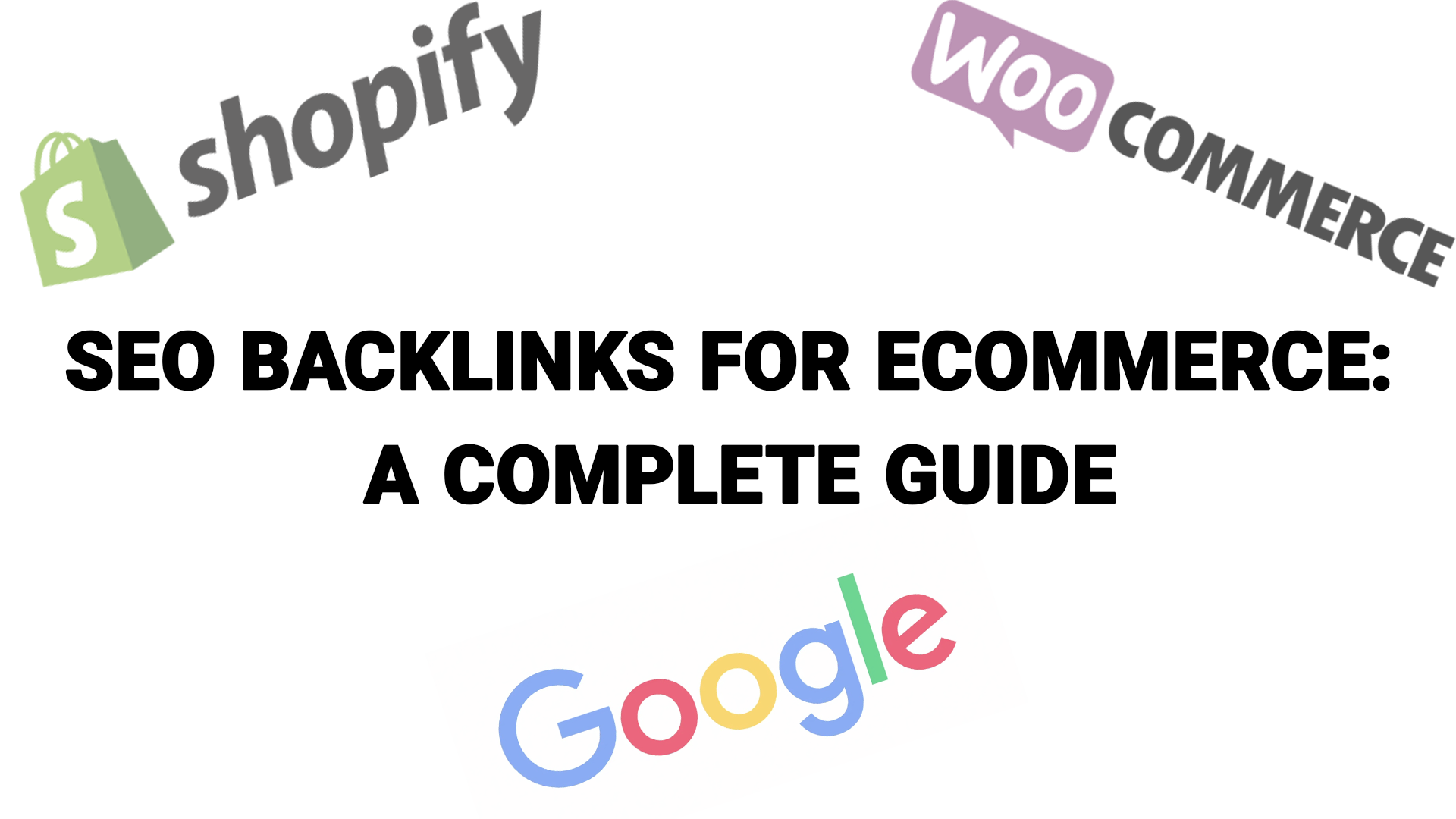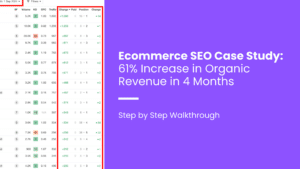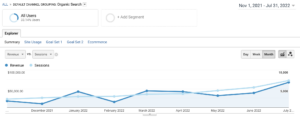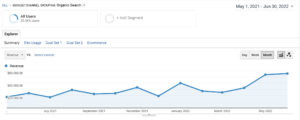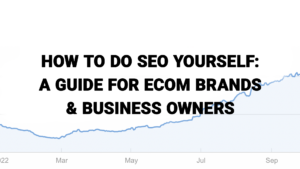Whether you’ve just launched an eCommerce website or you’ve been building an online brand for years, you’ve probably heard the term “backlinks” uttered a few times when it comes to eCommerce SEO strategies. An often confusing and controversial topic for SEOs and digital marketers alike, we’ve put together a Backlinks for Ecommerce Guide to explain what backlinks are, the different types, what makes them good or bad, how many you need, plus 19 unique ways for building backlinks to eCommerce websites.
What are backlinks and why build them in the first place!?
To start off, let’s discuss what backlinks actually are and why you should build them. At their core, they are very simple. When another website links to your website, that’s a backlink. They also help search engines connect and understand ideas across the internet, and in some cases help people surf the web by being introduced to new websites, products, and ideas. Additionally, they can also increase the authority of your website and make it easier for your website to land on the first page of the most important Google searches for your business.
Yes, it really is that simple. So, why the controversy?
As search engines and the web has evolved, there has been much debate over how much backlinks help, whether they follow Google’s guidelines, and whether they’ll get your website penalized for building them.
While it’s true the rules have changed many times, the most famous change being Google’s Penguin Algorithm update in 2012 that specifically targeted link spam, there are many ways that backlinks happen naturally and plenty of strategies you can use to form a link building campaign that will help you build quality backlinks to your website and will help you earn valuable traffic while steering clear of any link penalties.
What are the Different Types of Backlinks?
There are different types of backlinks? Yes, there are, and there is an important distinction that you need to consider when you build backlinks. The two types you need to consider are do-follow and no-follow backlinks. Websites can actually tag the links coming from their website as do-follow or no-follow and this tag will affect how powerful these links are for your website.
Do-follow Backlinks
Do-follow backlinks are the most powerful links to build and they pass what is referred to as “authority” or sometimes “link juice” from one website to another. More authoritative, notable, or trustworthy websites tend to pass more authority and value than others that have less trust across the web.
No-follow Backlinks
No-follow backlinks tend to not pass authority from one website to another, though this is a commonly debated topic in the SEO community. While they do not pass authority they do build what I call “trust” in the eyes of Google, which has more to do with the types of websites these links tend to come from than the links themselves.
Many no-follow links come from business listing websites and popular website directories that are considered common practice to add your website to. These links often require setting up a profile or even verifying your listing, which requires the manual input of an actual human (and not a bot just building links across the web).
What makes a good backlink?
Believe it or not, there are good and bad backlinks. Fortunately, for the most part, Google ignores the bad ones these days, which makes them more of a waste of time and resources than something that might earn you a penalty from Google.
With that being said, if you’re going to build backlinks, it’s important to understand what to look for in a link worthy of your time and resources.
How Trustworthy is the Website?
How trustworthy a website is can be a bit subjective, but a few things I look out for are the quality of the content on the website, how much traffic the website gets, how many other websites are linking to this site, and what keywords the website ranks for.
If something feels off about any of the above, you may want to consider not building a link from that website.
DR of website
DR or Domain Rating (sometimes called Domain Authority) is a third-party metric that was introduced by companies like Ahrefs and MOZ to help website owners understand their relative authority over other websites on the web. While this is not a metric Google uses, it is helpful in understanding how powerful a given link might be for your website.
DR is calculated on a scale of 0 to 100, with sites like the New York Times and Facebook earning scores in the high-90s and brand new websites often starting at zero. Your specific niche and industry might have a common DR range that the top sites in the space have reached. You should make this your niche-specific DR range your goal, as it’s highly unlikely you’ll build a website that ever earns a 90+ DR.
Placement on page
The best links are links that are in actual paragraph content on the website. While some websites and SEOs try to sneak links into footers, comment areas, and forums, if you want links to actually pass authority to your website, placement within the actual core content of a page is what you want.
Anchor text
Anchor text is the text on the page that is actually linked to your website. Sometimes this might be your brand name or website URL and other times it might be a specific phrase within a given piece of content. Anchor text is essential to crafting quality backlinks and needs to be managed properly to get the most out of your efforts.
Topical Relevance
While DR mentioned above can be powerful, an even more powerful approach to link building is to build links from topically relevant websites. These are websites that either directly talk about your specific niche or product area or discuss topics that are adjacent to what your website discusses or sells. An example: a website that sells beverages might look for links that discuss the specific types of beverages they sell, food websites, recipe websites, and home entertaining websites.
Linking to the Right Pages on Your Website
For most websites, the home page will be the most authoritative page and for many, the most important, but it shouldn’t be the only page you send links to. It’s also important to send links to other important pages across your website. These could be collection pages, product pages, or blog posts. The right link building strategy for your eCommerce store will factor in these pages and understand how link equity can be best passed around your site.
How many backlinks do you need?
The number of backlinks you need depends entirely on how competitive your niche is. If there aren’t many websites in your niche or aren’t websites actively investing in SEO in your niche, you might be able to get away with a one-off backlink campaign that will help you successfully rank for your top keyword phrases.
Unfortunately, most niches are at least moderately competitive and have a few websites that are consistently investing in SEO, and many niches where companies are aggressively investing in SEO. Because of this, you’ll most likely need to build links on a consistent basis to both keep up and gain ground on your competition.
In addition to keeping up with your competitors, links also go away over time. This can be for a variety of reasons. The most common being a website getting shut down, a piece of content linking to you being removed, or the linking piece of content being rewritten and removing the link you had earned.
Linking websites are not required to keep linking to you, so it’s to be expected that over a long enough time, some of the websites linking to you will change and remove some of your backlinks. This applies from sites like the New York Times to smaller websites you’ve never heard of.
19 Ways to Earn Ecommerce Backlinks
Now that we’ve thoroughly discussed the ins and outs of backlinks, let’s dive into 19 different ways you can earn high-quality backlinks for your eCommerce store.
Low-Hanging Fruit
I’ve labeled these links as low-hanging fruit because they are easy to earn, low-risk, but still can add plenty of value to your website.
1) Social Profiles
Social profiles are websites like Facebook, Instagram, and Pinterest that most online stores have links from. While many social profile websites have no-follow links, some have authority-passing do-follow links, and more importantly, having these profiles shows you’re engaging in activity that is common amongst similar websites to yours.
2) Business Listings & Citations
Similar to social profiles are business listings and citations. These are web properties like Google My Business, where you can add important information about your business. In most cases this is accurate information about your business name, hours, address, website, and what you offer. With these listings, it’s important to make sure this information is accurate across the web.
3) PR Blasts
If you have some news to share about a new product, the launch of your eCommerce store, or other intriguing news about your business a PR blast can be a great way to earn some trustworthy links across the web. Similar to social profiles and business listings, many of the news sites that syndicate your PR blast will have no-follow links, but I’ve found that PR blasts are great for building links to a brand new website that has never earned links before and occasionally can drum up quality business for your website or earn additional media coverage.
Leveraging Your Expertise
Another avenue to explore for earning links is to leverage your niche-specific expertise. While the knowledge you have about your business, products, and website might feel like common sense, many people across the web are eagerly wanting to learn tips and tricks related to building eCommerce brands and digital marketing in general. Simply being in the online space positions you as an expert worth hearing from, which will naturally lead to links pointing to your website.
4) Expert Roundups
Expert roundups are types of blog posts that gather input from multiple experts in a given field on a specific topic. They are valuable to readers because the post aggregates a wide range of opinions and valuable to you because they’ll earn you a link to your website and position you as an expert.
5) Podcast Interviews
Unless you’ve been living under a rock, you know that podcasts are booming and a great way to introduce you and your brand to new audiences. They are also great at generating backlinks. Once a podcast is posted online, there is usually a description connected to the podcast episode that will have a link to your website. This description is often shared to multiple-podcast listing websites and because people love podcasts so much, there is a high likelihood of the episode you’re on being shared across the web and earning your website additional links.
6) Media Coverage
Depending on what type of products your sell, you might find it advantageous to explore media opportunities for your eCommerce brand. This could include being interviewed on popular news shows at either the local, regional, and national levels, newspaper or magazine interviews, or interviews on popular YouTube channels.
Getting this coverage will introduce your business to the audiences of those outlets and also result in earning backlinks from the media outlets you engage with and increase the potential of additional backlinks from others who share the coverage.
7) HARO
HARO or Help a Reporter Out is a service that aims to connect online writers and reporters with relevant sources. By signing up for this service, you can gain access to opportunities to be interviewed or share your expertise with a wide range of online writers.
8) Help a B2B Writer
Similar to HARO, Help a B2B Writer is a service that connects writers specifically writing about running a digital or online business with online business owners and digital marketing specialists. While these writers are often not writing for websites that are directly related to your niche, making them less topically relevant, they do often write for highly reputable websites that are trustworthy and have high domain authority.
9) Events & Trade Shows
While a majority of link building happens online, being active in the real world is a great way to earn links to your website as well. If there are trade shows or other events that happen every year that are related to your niche, it might be worthwhile to become a vendor or sponsor of these events. Most conferences and trade shows will add a directory of vendors and sponsors to their website.
Content Creation
When it comes to being visible online, content will always be king and that applies to backlink building as well. Putting the resources into creating link-worthy content can pay dividends for years, as people will find the resources you create to be valuable long after you publish.
10) Infographics
Infographics are graphic assets that visually explain data or concepts. They are highly sharable since people don’t have to read as much to understand important data and information. This post you’re currently reading could easily be turned into an infographic by creating a visual representation of the 19 ways to build backlinks.
When you create linkable assets with data other blog posts that are looking to add value to their readership wind up linking to your website, making them highly valuable backlink assets.
11) PDFs or other Guides
Whether it’s a guide for your customers or for others in your industry, crafting a PDF or guide is a great way to create a linkable asset. Much like infographics, PDF guides are often heavily shared across the web, especially if they provide unique value to specific audiences.
12) Link-worthy Blog Content
Google loves fresh blog content, so consistently writing SEO content each month will add topical relevance to your website. If you do a great job of writing this content, you might wind up ranking your blog content for specific keywords and if you have unique data or information in your blog content, other websites might link to your content.
Blog content is also a valuable asset for sharing on social media, which could earn additional eyeballs on your brand, and thus could lead to additional backlink opportunities.
13) Video Content
Video content is becoming more and more popular online, most specifically on YouTube and social media channels. While video is a powerful tool for growing audiences, it can also be a great way to earn backlinks to your website. If your video content is engaging and explains something succinctly, others might be inclined to link to your video content and potentially your website.
Manual Outreach
The last type of link building strategy we’ll dive into is what I refer to as manual outreach. Manual strategies tend to ruffle the most feathers in the SEO community because some of the link building tactics involved in manual outreach produce what are called paid links. While that sounds sketchy on the surface, PR campaigns and media features on some of the largest websites online (like Forbes), require extremely large sums of money.
You can think of any monetary exchange in these strategies as mini-PR campaigns or features that are SEO specific. And to top it off, there’s an entire sub-SEO industry built around manual link outreach worth billions of dollars and for good reason – these strategies are some of the most powerful.
14) Guest Blogging
Guest posting or guest blogging is when you create content that is posted on a third-party website. There are a few advantages to guest posting. First, you can position yourself or someone on your team as an expert and gain visibility for your brand if the third-party site is notable.
But in addition to that, you have more control over the specific anchor text, the topical relevance of the content, and the URL you link to on your website. This allows for a more strategic approach to how you leverage authority from your links and build authority to your site.
15) Link Placements
Link placements are a cousin of guest posting. With a guest post, you’re writing fresh content that you have complete control over. With link placements, you are aiming to earn a link for pre-written content that is already on the web.
This can be achieved by reaching out to site owners and asking if they’d like to add a link to you in their content and often requires you to offer some form of value to the website owner to secure.
16) Broken Link Building
Broken links are links that used to link to a website but no longer do. There are SEO tools, like Ahrefs and SEMRush that allow you to scan websites for broken links, including your competitor’s backlinks, for broken link opportunities.
Since it’s not helpful for a website to have broken links, you can reach out to website owners and let them know you’ve found a broken link on their website and in exchange for pointing this out to them, ask for a link to your website in return.
17) Vendor Links
If you sell products from a wide range of vendors, a great way to earn some topically relevant backlinks is to ask your vendors to link to your online store. Some vendors will have resource pages that link out to all of their distributors or it might also be possible to see if the vendor is willing to include your brand in a new blog post.
18) Brand Mentions
A brand mention is when another website mentions your brand name. Unfortunately, not all brand mentions wind up actually linking to the online store mentioned. The good news is that this is a relatively low-friction link building strategy as many site owners will gladly add a link to where you’ve been mentioned on their website and most of the common SEO tools on the market have the ability to scan for these opportunities. This strategy can is very similar to building broken links.
19) Sponsorships
The final link building strategy we’ll discuss is sponsorships. Sponsorships could be for a local little league baseball or sports team, a park, or even event sponsorships. These sponsorships can earn your brand a lot of attention and thus backlinks. They also will usually produce a lot of positive brand associations since your sponsorship will be helping out something positive in your town or field.
Backlink Strategies You Should Avoid
As mentioned earlier, not all link building campaigns are created equal and some link building strategies can result in a waste of resources or worse, a penalty from Google. While Google mostly ignores poorly built links today, there are still some instances where a poorly managed campaign will earn you a penalty for trying to manipulate the search engines.
Here are a few link building efforts that I encourage you to avoid.
Using PBNs
PBNs are Private Blog Networks that are built and specifically designed for the sole purpose of building backlinks. While this used to be a very powerful strategy that some SEOs still employ and stand behind, it’s a strategy that tip-toes into murky waters and can easily position you to earn a negative penalty from Google if mismanaged.
Trying to Buy Backlinks yourself
As mentioned earlier, some manual outreach and PR efforts can result in needing to pay websites to link to your online store, even if you create content for them. There are even manual outreach vendors that you can pay to do this for you. Unless you are a seasoned SEO specialist, I highly recommend doing this yourself. You should instead pay an agency to handle this for you, as they will have a better understanding of how to use proper anchor text and other strategies to make these efforts worthwhile and positive for your business.
Comment link building on forums and blogs
The last and final link building strategy you should avoid is using blog comment areas and forums to build links to your online store.
While these links often happen naturally when advocates for your brand link to your website, it’s a bit spammy to do this on your own and often results in a bunch of unnecessary no-follow backlinks.
These are valuable links when your customers link to you because they are usually linking to you in a comment or forum thread where other prospective customers are engaging with each other. Doing this on your own is usually a waste of time and resources.
Ready to Launch a Link Building Campaign?
It’s probably no surprise that a comprehensive link building campaign takes a lot of resources and requires strategies that cannot be learned overnight. If you’re looking for an SEO consultant, link building specialist, or white label link builder that consistently gets results, reach out to our team at Noah Kain Consulting. We can help you plan out and execute a backlink strategy that aligns with your business goals, create a sound backlink profile, increase search rankings and drive eCommerce sales. Contact us here to get started.
P.S. – You can share the “19 Ways to Earn Ecommerce Backlinks” in an infographic as well! Simple using the link below

